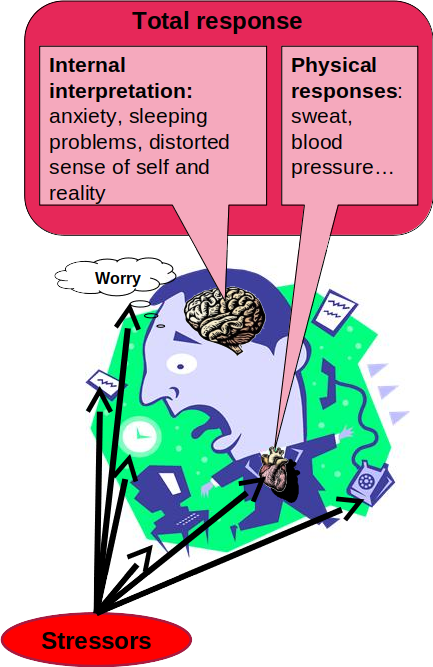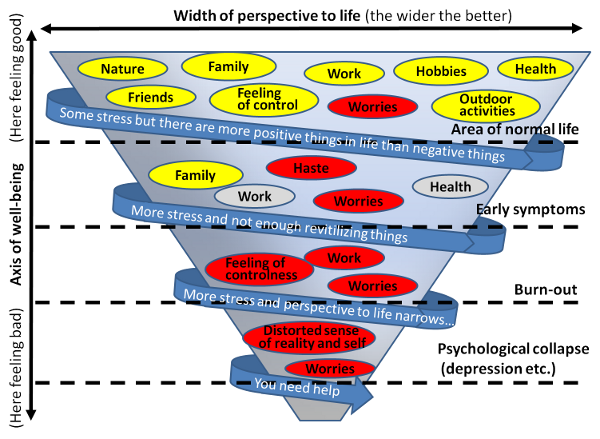Stress Management Part 1
Introduction
My company Metosin takes stress management seriously. I have been working at Metosin just a few months and I have already attended many lectures regarding stress management, well-being and how to strengthen mental resilience. In one of these meetings, I remembered that I have written a five-part series about stress management in my old corporation’s internal blog. The series was a success (got many more readers than my usual dull technical posts). At some point, the HR department heard about the blog series and asked me to give a lecture about the subject. I did that and I got plenty of positive feedback. Now after some ten years, I decided to update the material a bit and create a new five-part Stress Management post series in my blog.
Why Do I Think I’m Qualified to Write about Stress Management?
I have spent my professional career in the software production field for which I have a degree in software engineering from the Helsinki University of Technology (1995). Reading psychology related books has been one of my hobbies for the last 30 years since I graduated from the University of Helsinki majoring in psychology (1991). So, I haven’t been working as a psychologist even though I’m fully qualified to do so (let’s be honest - the salary in IT is a lot better and it’s fun to build things), but I have the theoretical knowledge about the topic.
I feel that this blog post and the following 4 stress management related posts just might be much more important than my technology related blog posts. During my 25 years in the field of software production, I have seen how devastating stress can be in one’s life. I have seen mild and more serious stress symptoms among my colleagues (and in myself). I have even seen several cases for people spending long sick leaves because of stress, burn-out and depression. The most important reason why stress is so common in IT industry is haste and tight schedules, which make people feel that they are constantly hunted by a pack of lions (more about that later). If I can prevent even one psychological collapse of some stressed colleague of mine; i.e. when he or she is reading these posts and understands his or her stress situation and he or she decides to take measures to handle his or her stress using some of the tools mentioned in these posts - it was worth to spend the time writing these posts.
What is Stress?

What is stress?
Definition of Stress by the Free Dictionary: ”Stress is defined as an organism’s total response to environmental demands or pressures. …the word stressor has been used for the stimulus that provokes a stress response. … (physical) external response that can be measured by changes in glandular secretions, skin reactions, and other physical functions, … internal interpretation…”
So, stress is something you tend to react with various physical and psychological reactions stimulated by stressors, e.g. strict dead-lines at work, a difficult situation at home, etc.
The Vicious Cycle of Stress
Let’s first look at the graph below - “The Vicious Cycle of Stress”.

The Vicious Cycle of Stress.
So, what do we see in this graph?
1. There are two dimensions:
- Axis of well-being. This axis illustrates your feeling of well-being. The upper you are the better you feel.
- Width of perspective in life. This axis illustrates your perspective in life. The wider it is the more you feel you have interesting and revitalizing things in life.
2. There are some interesting conclusions to be drawn from the graph above:
- The wider your perspective in life is the better you feel. This is pretty obvious when you think about it. If you have good health, hobbies and outdoor activities, good relations with your family, a lot of friends (or at least a couple of good friends) and interesting work you are usually feeling good. You may have some worries but on the average, you have more revitalizing (yellow) things in life than consuming (red) things.
- If you experience stress in life that you cannot cope you go down in the Vicious Cycle of Stress. This is also pretty obvious but an utterly important issue to understand. Everybody has some worries in life. The point is to have more revitalizing things in life than consuming things. And you must have tools to handle stress to be on the area of Normal life. If you don’t you are going to drop down to the area of Early symptoms.
- If you go down to the next level in the Vicious Cycle of Stress, your perspective in life narrows and your overall well-being suffers. You may feel that there are more consuming things (red) than revitalizing things (yellow) in your life. Some revitalizing (yellow) things may have turned into neutral (gray) or consuming (red) things (like work on the area of Early symptoms).
- If you don’t do something about the stress your situation on average is just going worse. That’s why I call it the Vicious Cycle of Stress, you tend to go down. The next level might be pretty serious: Burn-out. In this area all the revitalizing (yellow) things in your life have disappeared (at least from your perspective in life, even though they still are there), or things that used to be revitalizing have turned into consuming things (like work on the area of Burn-out). You feel that the only things in your life are just worries, stress at work, and feelings of lack of control. The area of Burn-out is already pretty bad even though you still might be hanging in work. You may think that your situation is already horrible but something more dreadful is just lurking around the corner if you don’t do something to go back up to healthier levels.
- The bottom level is a psychological collapse. In the area of Burn-out you might still have been part of the workforce but most probably you were on sick-leave already on that level. If you weren’t, now you are definitely going to be. Congratulations! You have hit the bottom. Let’s be positive: now the only way is up. If you have not done anything to make your situation better in the previous levels the dear doctor is going to make the decisions for you now. The stress and burn-out have consumed all energy out of you and have seriously distorted your sense of reality and self (you see the world and your life as black and hopeless and your self-esteem is next to zero). You need a major sick-leave and most probably also pharmaceutical and psychological help to recover from the bottom. You don’t want to be here, do you?
Ok, I got it, stress is bad. But how do I handle stress?
A good question. Well, this blog post is just the introduction and orientation so that you know the basic concepts and the idea of what is going to happen to you if you don’t do anything to stress. The most important thing for you to remember from this blog post is that you tend to go down if you don’t do anything to stress. You may be hanging in your life for some time even with strong stress, but eventually, it will pull everyone down to the next level sooner or later. For some individuals, it may take only a couple of months, for some it may take years. The feeling of stress is also very personal: some individuals may handle a lot of challenging issues in life that another person might call extreme stress and break under pressure. But on average, everyone goes down with enough pressure and time.
So, in the following blog posts in this Stress Management series, we are going to discuss how to recognize the problems as soon as possible before things turn out to be too bad for you so that you are still able to take care of them. We are also going to discuss how to handle stress. The psychological research has found new promising and easy to learn stress management tools for everyone to use in his or her life. Some of the tools are just common sense (like talking to friends and taking care of your physical health). I’m also going to give you references to some books I have read myself about the subject and that I have also recommended to some of my friends who have asked my counseling regarding how to handle stress in their life.
So, stay tuned for the following four posts. And let’s handle stress before it handles us!
The writer has double majors: Master of Arts (Psychology) and Master of Science (Software Engineering). The writer has spent his career in the field of software industry but still reads various psychology related articles with great interest.
Kari Marttila
Kari Marttila’s Home Page in LinkedIn: https://www.linkedin.com/in/karimarttila/
